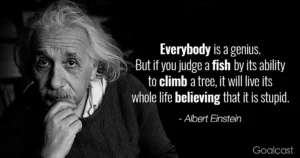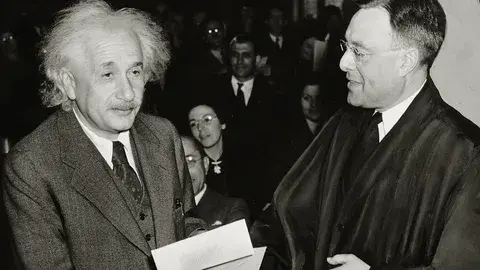What sets them apart?
You might think of Albert Einstein.
When we talk about, we’re diving into a world of curiosity, brilliance, and groundbreaking ideas.
He’s not just a name; he’s a symbol of human intellect.
His theories revolutionized our understanding of space, time, and energy.
But who was he really?
Let’s break it down.
A Glimpse into Einstein’s Life
Born on March 14, 1879, in Ulm, Germany, Einstein was anything but ordinary.
He had a curious mind from a young age.
While some kids played with toys, he was fascinated by how things worked.
As a child, he had difficulty in school.
Teachers found him too rebellious and challenging.
But he didn’t let that stop him.
Instead of conforming, he learned to think outside the box.
At 16, he famously failed an entrance exam to the Swiss Federal Polytechnic.
Instead of giving up, he pursued his education at home.
Fast forward to 1905, a year often called his “Annus Mirabilis”, where he published four groundbreaking papers.
These papers changed the landscape of physics.
The photoelectric effect, Brownian motion, special relativity, and mass-energy equivalence—all in one year!
Imagine having that level of productivity.
Special Relativity and Mass-Energy Equivalence

Let’s dive into two most famous theories.
Special Relativity is all about how space and time are intertwined.
You’ve probably heard of the equation \(E=mc^2\).
This equation states that energy (E) is equal to mass (m) multiplied by the speed of light (c) squared.
Mind-blowing, right?
This concept has far-reaching implications.
It tells us that mass can be converted into energy and vice versa.
Think about nuclear power.
That’s his legacy in action.
The other major breakthrough was the photoelectric effect.
He showed that light behaves like particles, not just waves.
This was crucial for quantum physics.
In fact, his work on this earned him the Nobel Prize in Physics in 1921.
The Personal Life of Einstein
He wasn’t just a scientist; he was a complex person.
He married twice and had three children.
His first marriage to Mileva Marić was filled with challenges.
They faced financial struggles and personal conflicts.
Ultimately, they divorced in 1919.
His second marriage to his cousin, Elsa Löwenthal, brought him stability.
But fame came with its own challenges.
He became a global celebrity, often scrutinized by the public and media.
The Political Activist
He was also deeply involved in political issues.
He was a pacifist, opposing war, especially World War I.
However, when World War II loomed, he changed his stance, warning the U.S. government about the potential of nuclear weapons.
He even signed a letter to President Franklin D. Roosevelt.
This letter urged the development of atomic research.
Einstein felt it was crucial to act to prevent a dictatorship.
He used his fame for the greater good, advocating for civil rights and humanitarian causes.
The Legacy of Einstein
He passed away on April 18, 1955, but his legacy lives on.
His theories laid the groundwork for many technological advancements.
Think about GPS and modern electronics.
They wouldn’t exist without his contributions.
Even today, scientists continue to build upon his work.
Isn’t it fascinating how one individual can shape our understanding of the universe?
FAQs About Einstein
What was Einstein’s most famous theory?
His most famous theory is the theory of relativity, particularly his mass-energy equivalence equation \(E=mc^2\).
Did Einstein really fail school?
Yes, he did struggle in school. His unconventional thinking didn’t mesh well with the rigid educational system.
Why is Einstein considered a genius?
He is considered a genius for his groundbreaking contributions to physics, particularly in understanding the nature of time and space.
How did Einstein influence modern science?
His theories have influenced everything from nuclear energy to our understanding of black holes and the universe’s expansion.
What were Einstein’s political beliefs?
He was a pacifist and advocated for civil rights. He believed in using his fame to promote humanitarian causes.
Reflecting on Einstein’s Impact
When I think of his I see a man who didn’t just think differently; he changed the way we think.
He showed us that questioning the status quo is essential.
He once said, “The important thing is not to stop questioning.”
His relentless curiosity led to discoveries that still impact us today.
So, what can we learn from him?
Lessons from Einstein
Curiosity Matters: Never stop asking questions.
Failure is a Steppingstone: Use setbacks as learning opportunities.
Think Differently: Challenge conventional wisdom.
Use Your Voice: Stand up for what you believe in.
The Science Behind the Genius
His work also brought about a new way to look at science.
He challenged scientists to think beyond traditional boundaries.
This led to new fields like quantum mechanics and cosmology.
Einstein in Pop Culture
His image is everywhere, from T-shirts to memes.
He represents not just intelligence but the idea that anyone can challenge the norms.
You don’t have to wear a lab coat to think like a scientist.
Final Thoughts
His life was a testament to the power of imagination and intellect.
His theories continue to inspire generations of scientists and thinkers.
We owe much of our understanding of the universe to him.
So, next time you hear someone mention remember the man behind the name.
He wasn’t just a physicist; he was a trailblazer, a thinker, and a humanitarian.
As we navigate our own paths, let’s embrace curiosity and challenge our assumptions.
Who knows?
We might just uncover our own groundbreaking theories.
The next he could be just around the corner, and it could be you!
In the world of ideas, will always be a guiding star.
Read More: https://aitrendstoday.site/

